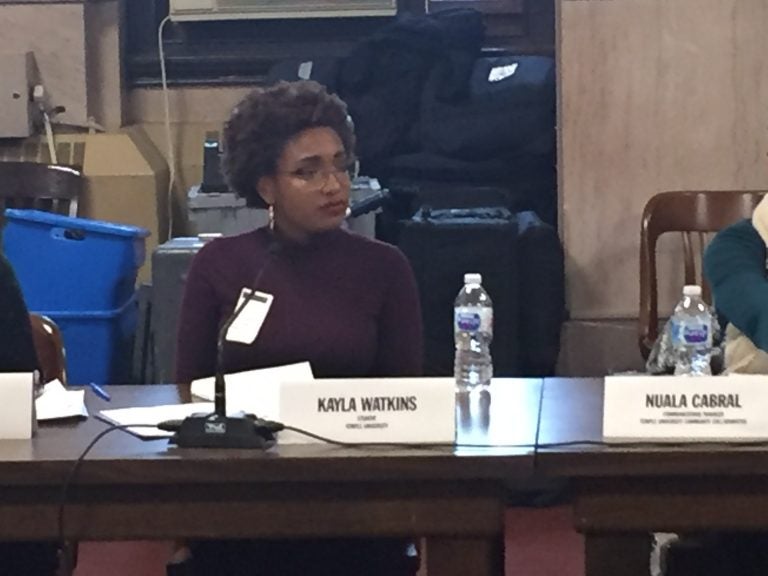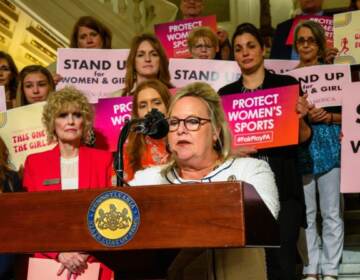‘A form of daily terror’: Pa. lawmakers gather to address street harassment
Street harassment is defined on a continuum that starts with catcalls and sexually explicit remarks and extends to slurs, groping, stalking and assault.

Kayla Watkins took part in a roundtable discussion on ways of ending harassment on the street. Watkins says it's a "daily form of terror." (Annette John Hall/WHYY)
For Kayla Watkins and other young women, being subjected to street harassment is a dreaded part of daily life.
“I’ve been being street-harassed since I was 12 and it’s been a constant struggle,” she said. “It’s a form of daily terror for me and many other young women like me.
“I have missed school to avoid harassment,” she added. “I have been late to avoid certain routes so I am not harassed. I pick out my outfits every single day in an attempt to avoid harassment, knowing that it really doesn’t matter because I’ve been harassed in pajama pants and a winter coat.”
The graduate student works with the Temple University Community Collaborative, an organization that helps build and support young leaders. She was part of a roundtable convened at City Hall by state Sen. Larry Farnese, D-Philadelphia, and the Senate Democratic Policy Committee concerning street harassment.
In light of recent allegations of sexual abuse of women by Harvey Weinstein and former NPR news chief Michael Oreskes, the discussion seemed especially timely.
“It’s time to quit ignoring and excusing street harassment,” Farnese said. “It’s time to take substantive steps to prevent, deter and expose this brand of abuse for what it is.”
Street harassment is defined on a continuum that starts with catcalls and sexually explicit remarks and extends to slurs, groping, stalking and assault.
According to a 2014 survey commissioned by Stop Street Harassment, a Washington, D.C. nonprofit, 65 percent of women say they experienced such violations by strangers on the street.
The study also revealed that more women, LGBQT-identified individuals and people of color experience street harassment compared to men, straight-identified people and whites.
Roundtable participants included representatives from the Pennsylvania Coalition Against Rape, Women Organized Against Rape, the Women’s Law Project and Philadelphia Commission for Women.
The biggest question, said Terry Fromson, managing attorney of the Women’s Law Project, is whether implementing more laws will help prevent street harassment.
“The Pennsylvania crime code covers most of most egregious street behavior — contact, exposure, threatening, indecent assault, lewdness, harassment and stalking. Do we need more law?” Fromson said. “If we do, and if they focus on words, they might be subject to challenge under the First Amendment.”
For Watkins and other women like her — African-American and low income, who often live in the same neighborhoods with the men who harass them — reporting to law enforcement could put them in even more danger, she said. Not only that, a lot of women don’t trust the police.
“Especially if the officer is going to make reference to the clothing that you’re wearing, make reference to how long you’ve been out, make reference to traveling alone. So you’re kinda caught at an impasse where you don’t want to endanger your own community, but you don’t want to endanger yourself either,” said Watkins, who said she’s endured harassment on the street as police officers watched.
The roundtable discussion sought strategies for preventing street harassment, including collecting data to better understand the scope of the problem; implementing public-awareness campaigns; and holding educational workshops for potential victims as well as perpetrators.
That’s the only way to bring about a cultural shift, Watkins said.
“Just like we know throwing something away on the street is making my city worse, we should know automatically that street harassment is making my city worse,” she said.
WHYY is your source for fact-based, in-depth journalism and information. As a nonprofit organization, we rely on financial support from readers like you. Please give today.




